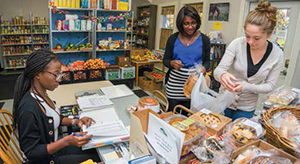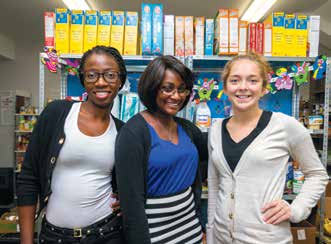
Service learning is an education method that integrates community service with academic coursework by focusing on critical, reflective thinking. While volunteer work tends to be extracurricular, and internships generally offer students hands-on experience in a field related to their major, service learning promotes scholarly learning and benefits local communities by addressing identified social problems.
Though communities realize significant benefits, students do, too. Research shows that service learning has a positive impact on students' academics and their sense of personal responsibility. It reduces stereotypes and contributes to stronger leadership, teamwork and communication skills.
After reading the evidence and considering how best to coordinate a service learning project, I offered an opportunity to my sophomore Pathway students last spring that led to an unforgettable experience. My Pathway class, The Rich Get Richer and The Poor Get Poorer, was designed around the theme of socioeconomic inequality in the United States and contained are required service-learning component. During the first-year seminar, we read and discussed a wide range of general audience literature and popular culture texts that described the daily realities, ideologies and aspirations of people at various positions on the social class spectrum. Specifically, we worked to situate personal experiences within larger social and historical contexts.
In the sophomore seminar, we deepened our study with more advanced scholarly research studies. As we continued to explore how money and status, or lack thereof, shape peoples' lives, students gained firsthand knowledge of how nonprofit organizations address the quest for financial security through their policies, practices and assigned service activities.
Students researched agencies committed to helping economically insecure people within a one-hour radius of campus. They contacted each organization to learn more about its mission and to determine if it needed assistance. The information became a community service database available to all Colby-Sawyer students who seek volunteer or service-learning opportunities.
My students were allowed to complete their service with any agency on the list, and their choices resulted in three partner agencies. While working with the Kearsarge Lake Sunapee Community Food Pantry in New London, students stocked the pantry and distributed food. At Friends of Forgotten Children in Concord, students helped with general grounds maintenance; organized a massive collection of donated toys, furniture and clothing; and were able to observe clients as they received assistance. Students who worked with the Mobile Mission Program at Rise Again Outreach in Loudon rode along on the donation bus that distributed toiletries, clothing and food to homeless shelters and struggling neighborhoods. They helped stock the buses, organize the warehouse and match clients with products.

When I assigned this project, I hoped that participating in service activities would help students gain a more practical understanding of course content and its connection to our region of the state. I was well aware of the belief that there are no poor people in New London and the surrounding area. Traveling to homeless shelters, talking to people working full-time but living in tents, and meeting families relieved to be given a loaf of bread and some canned goods demonstrated that poverty exists in our communities. Jobs are not as plentiful as some people think, and not all employment offers a living wage.
My students also learned that you cannot always tell someone's financial status at a glance. “At Friends of Forgotten Children, I learned that you can't judge a person by what they wear, how they act or where they live,” said Connor Delaney '15. “Just because a person or family appears fine doesn't mean they are.”
Sarah Wiley '15 distributed donated goods in disadvantaged neighborhoods. “My service-learning experience taught me that the smallest gestures can have a big impact,” she said. “A smile or a quick conversation may not change a person's life, but it can turn their day around. No one is too small to make a difference.”
While these are just a couple examples of the learning that took place, students overwhelmingly agreed that meeting people and being introduced to these organizations were the best parts of the project. Final course evaluations confirmed that the service-learning component furthered their understanding of the course material, increased their likelihood of volunteering for a community agency in the future, and gave them a better sense of local social problems.
Summarizing the course experience, one student wrote, “Everyone should take this course because it is eye opening. Many people have a broad knowledge about the rich and the poor, but this class actually allows students to learn the consequences of this gap.”
-Kathleen Farrell, Associate Professor, Social Sciences & Education


